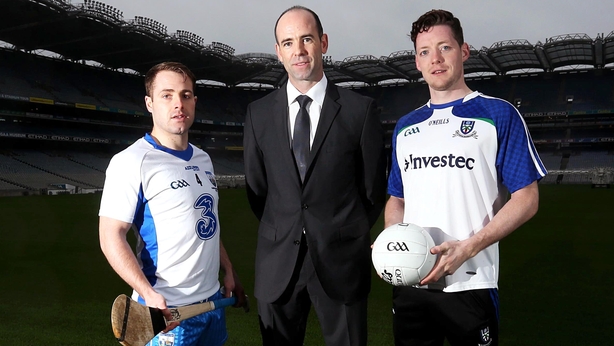Dermot Earley has been named as the new Gaelic Players Association chief executive and has pin-pointed changes to Championship structures as his most pressing concern.
Earley takes over from Dessie Farrell, who was a founder member when the inter-county player representatives' body was set up in 1999.
Farrell was elected chairman of the GPA at the organisation's first AGM in 2000 before being appointed as the first full-time CEO in 2003 and Earley acknowledged that replacing him will be a major challenge.
"I’m honoured to take up the role," he told RTÉ Sport.
"I’ve big shoes to fill, Dessie has built this organisation from the ground up and it’s up to me to build on the foundations he has laid.
"Obviously, I’m new to the job so the first thing I’ll do is take soundings from all our stakeholders. By stakeholders, I mean the players, the GAA, Sport Ireland, the government and the media."
Earley’s first task will be to prepare for the GAA Congress next month and he has signalled that changes to the structure of the football and hurling Championships are his most pressing concern.
"The first thing we have to look at is the Championship structures."
The GAA has already announced proposals for major changes to the All-Ireland Senior Football Championship, which includes adding a group stage to a condensed competition.
The proposal will go before the Congress and Earley believes that there’s an "appetite for change" among the members of the GPA.
"The first thing we have to look at is the Championship structures," he said. "I think there’s an appetite for change throughout the country at both county level and club level.
"When you look at the current structures at the moment we have a competition that isn’t fair, starts at different times for different teams and different provinces. That’s something we would like to address."
Earley is content to wait and see what congress will bring before deciding on a course of action, but warned that if there is no change this year, the GPA could bring a motion of their own next year.
"Obviously we would like to bring a proposal to congress this year. Part of the agreement with the GAA in 2016 was that we could bring a motion directly to congress but that has to be passed at congress in February.
"We’ll assess whether or not there is any change to the Championship structure this year and hopefully we’ll be able to present something new to congress next year."

Securing increased funding for the GPA will also be a major part of Earley’s agenda.
Last summer the GAA and GPA announced a new framework agreement worth €6.2m per year to the players association.
Part of that agreement also saw the GAA agree to provide €2.5m or 15% of net central commercial revenue (whichever is higher) in each of the first three years of the agreement.
Earley is eager to build on that agreement and going forward is hoping to improve on that initial agreement, with an eye on negotiations which are scheduled for 2019.
"That funding is so important because it funds the programmes that we provide to our players," he insisted.
"It was a historic deal to actually get a share of the commercial revenue that’s generated on the back of the inter-county player. It’s only a small piece but it funds the programmes we provide.
"Obviously the GAA have had new deals on the commercial side so we’ll be monitoring them closely and we’ll have a next round of negotiations in 2019, so we’ll be watching that space very closely."
Looking to the more immediate future, Earley signposted what the next two months will hold for him ahead of congress.
"It’s going to entail an awful lot of engagement. I will get out and meet a lot every single squad.
"I mightn’t get to meet them all prior to congress but when you mention congress, the motions that will be going forward will be delivered to the players. They will decide on which way the GPA vote."
